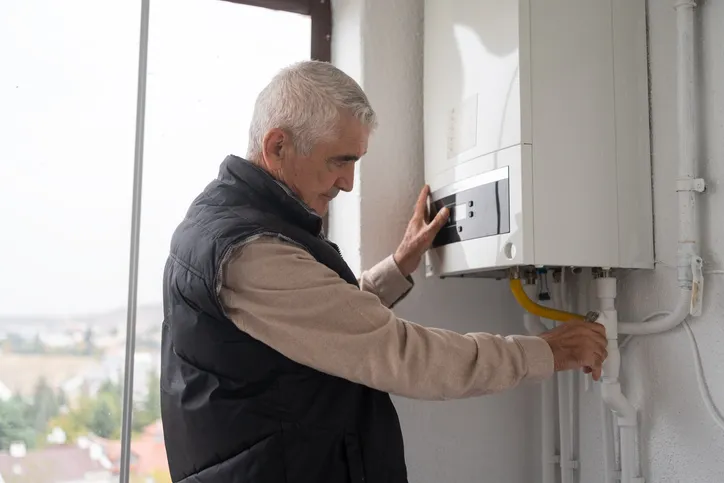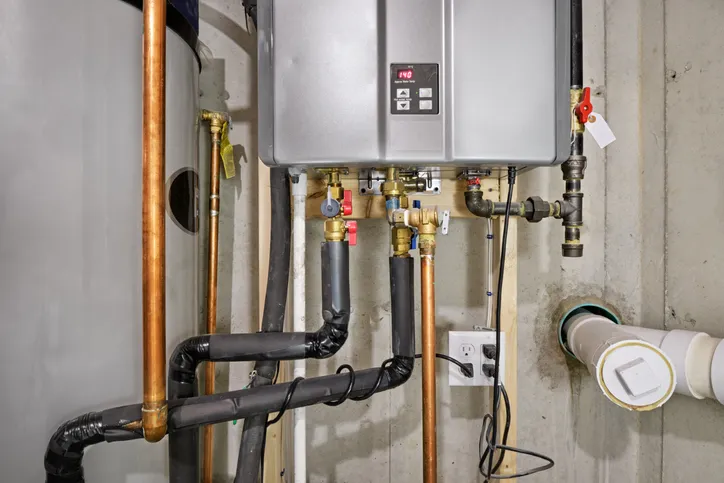Water Heater Repair Calabasas, CA
Serving Ventura & Sacramento Counties

When your hot water isn’t working or your water heater is leaking, it disrupts daily life fast. In Calabasas, CA, where many homes mix modern construction with older systems and local water can carry higher mineral content, timely water heater repair protects your comfort, your home, and your wallet. This page explains common water heater problems in Calabasas, practical troubleshooting steps technicians use, typical repairs and parts replacement, and proven ways to extend the life of a tank-style water heater.
Common water heater issues in Calabasas homes
Understanding the likely causes helps you prioritize repairs and avoid bigger failures later.

Visible leaks
- Source: corrosion at the tank, loose fittings, failed drain valve, or a faulty temperature and pressure (TPR) relief valve.
- Risk: water damage to floors, walls, and foundations—especially concerning in hillside or slab homes common around Calabasas.
No hot water or intermittent hot water
- Source: failed heating element (electric), bad thermostat, or for gas units a faulty pilot light or gas control valve.
- Symptom: cold showers early in the morning or after long usage cycles.
Pilot light or ignition problems (gas heaters)
- Source: clogged pilot orifice, thermocouple failure, or issues with the gas line.
- Safety note: irregular ignition can lead to incomplete combustion or unsafe conditions.
Sediment buildup and rumbling noises
- Source: hard water deposits collecting on the tank bottom and heating elements.
- Symptom: popping or rumbling sounds, reduced heating efficiency, and shorter tank life.
Rusty or discolored water
- Source: corroded anode rod or internal tank corrosion.
- Symptom: orange or brown water from hot taps, which indicates the tank may be deteriorating.
Poor water pressure or strange odors
- Source: scale-clogged plumbing, bacterial growth in low-use systems, or failing components.
High energy bills
- Source: failing thermostats, leaking tanks, or sediment forcing the heater to run longer.
How water heater troubleshooting and diagnostics work
Professional diagnosis isolates the real problem faster and safely.
Visual and safety inspection
- Check for signs of corrosion, leaks, rust, and proper venting for gas units. Confirm there are no standing puddles or active drips.
Functional testing
- Measure water temperature, confirm thermostat operation, and test TPR valve relief. For gas units, inspect pilot assembly and ignition sequence.
Electrical and gas checks
- For electric heaters: measure element resistance and verify voltage at the element terminals. For gas heaters: test gas pressure, burner operation, and combustion quality.
Drain and sediment inspection
- A partial drain can reveal sediment levels. Heavy sediment usually causes noisy operation and poor heat transfer.
Anode rod and corrosion assessment
- Inspect the sacrificial anode rod for depletion. A heavily consumed anode indicates the tank metal is being exposed and may be near the end of serviceable life.
Typical repairs and parts replacement
Repairs focus on restoring safe, efficient operation while avoiding unnecessary replacement.
Thermostat and heating element replacement (electric)
- Replacing failed elements or thermostats frequently restores function quickly and improves efficiency.
Pilot assembly, thermocouple, and gas control valve service (gas)
- Cleaning or replacing the pilot or thermocouple often fixes ignition issues. A failing gas control valve is more complex but commonly replaceable.
Anode rod replacement
- Replacing the anode rod is a low-cost way to substantially extend tank life when caught early.
TPR valve and drain valve replacement
- These safety and service components fail with age and mineral buildup and should be replaced when compromised.
Tank patching vs tank replacement
- Small external leaks sometimes allow temporary patching, but internal corrosion and tank breaches generally require full replacement. Most tanks older than 8 to 12 years with internal corrosion are safer to replace.
Sediment removal and flushing
- Thorough flushing and, when necessary, element cleaning can restore efficiency. In cases of extreme scale, replacement may be the best long-term solution.
Upgrades
- Replacing inefficient controls, adding insulating jackets (where appropriate), or recommending a water softening solution for high-mineral homes can reduce future problems.
Extending your water heater’s tank life
Routine care prevents failures and saves energy over time.
Annual flushing
- Flush the tank at least once a year to remove sediment. In Calabasas homes with harder water, more frequent flushing may be necessary.
Inspect and replace the anode rod every 2 to 4 years
- Anode rods protect the tank from corrosion. Replacing a worn rod is one of the most cost-effective longevity measures.
Set thermostat to 120 degrees F
- This temperature reduces scale buildup, saves energy, and lowers scald risk.
Test the TPR valve yearly
- Ensure the valve operates freely—this is a critical safety component.
Address small leaks immediately
- Even minor drips accelerate corrosion and lead to costly replacement if ignored.
Consider water treatment for hard water
- A water softener or whole-home filtration can significantly reduce sediment formation and protect your heater.
Schedule professional tune-ups
- Annual professional inspections catch early wear, verify safe operation, and optimize efficiency.
Why prompt repair matters in Calabasas
Delaying repair increases the risk of property damage, higher energy bills, and sudden total failure. Calabasas homeowners often face a combination of older systems and mineral-heavy water that accelerates wear. Addressing issues early preserves home value, prevents water damage in sensitive hillside plots, and ensures safe operation of gas appliances.
A professional diagnostic that prioritizes safety checks, correct parts replacement, and sensible maintenance planning gives the best chance to keep your water heater running reliably and efficiently for as long as possible. Quality repairs focus on restoring performance now and preventing repeat failures later.
Get Hot Water Back Fast
When your water heater leaks, rumbles, or stops delivering hot water, AirWorks Heating Air Plumbing is ready with expert repair services in Calabasas. Our licensed plumbers quickly diagnose the problem and restore safe, reliable performance using quality parts. Concerned about unexpected repair costs? Ask about our flexible Financing options that make urgent fixes more manageable. For year-round peace of mind, protect your system with our Maintenance Plan, designed to extend equipment life and prevent breakdowns. Call today and get your hot water flowing again.


